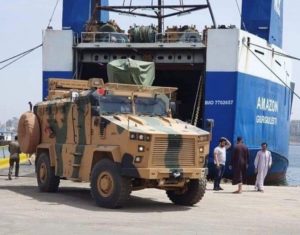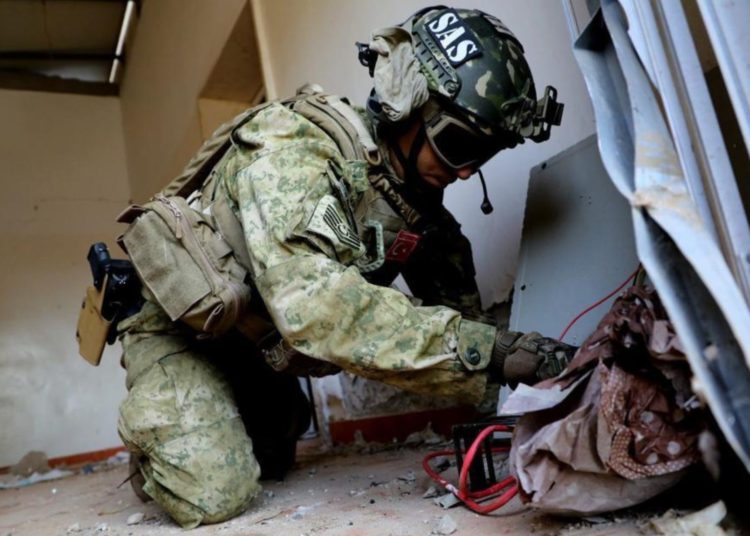Abdullah Bozkurt/Stockholm
The Turkish government has continued to pour arms and materiel into Libya in a blatant breach of United Nations Security Council resolutions that imposed sanctions on arms transfers to the war-torn North African country.
In a report submitted to the Security Council on May 24, 2022, UN investigators concluded that the Turkish government was continuing to violate UN sanctions by transferring military articles and providing lethal training to Libyan factions.
The UN assessed that most of the military training provided by Turkey to the Government of National Unity Affiliated Forces falls under the sanctions regime and thus violated UN resolution 1970 (2011). It said the only exemption would be for some types of training such as ordnance disposal that may be classified under humanitarian training. However, combat training, special forces training and sniper training are barred by the UN Security Council, the report underlined.
According to a Turkish Ministry of Defense statement on November 30, 2021 the Turkish army had completed the training of 6,799 Libyan soldiers, with 974 still in training. The UN investigators asked Turkey in a letter to provide details on the military training of Libyan troops, but in February 2022 Turkey declined to provide specifics on that. In total Turkey responded to only seven letters out of 15 sent by the UN panel of experts that monitors the Libya sanctions regime.
The UN also pointed out that an air bridge set up by the Turkish Air Force between Turkey and Libya to help the Government of National Unity is also considered a violation. At least 33 flights by a Turkish Air Force-operated Airbus A400M delivered an estimated 1,221 tons of cargo from May 2021 to March 2022 even though flights by Turkish military cargo aircraft into Libya declined by 62 percent compared to the previous period.
UN report on violations of Libya sanctions submitted to the Security Council:
In addition to Turkish government entities, private companies based in Turkey were also red flagged by the UN experts for arms violations. They included commercial explosives manufacturer Kapeks Kimya Sanayi A.Ş., maritime and logistics firm Arkas Denizcilik ve Nakliyat A.Ş, airline operator Mng Hava Yolları ve Taşımacılık A.Ş. (MNG Airlines), arms manufacturer Asi Makine San. Tic. Ltd. Şti (Sur Arms) and the Akar Group. Most of these companies failed to respond to UN inquiries.
Some of the arms sent to Libya by Turkey included M-60 Patton tanks, Bayraktar TB2 drones, STM Kargu-2 drones, TAI Anka drones, 155mm Fırtına T-155 artillery cannon, 35mm Korkut cannon, MIM-23 Hawk missiles, Roketsan 122mm Sakarya T-122 MLRS artillery and Roketsan-made rockets, 5.56 mm MFR Multi-Functional Rifles, 5.56 mm MPT 55K Assault Rifles, 7.62 x 51mm JNG-90 Bora-12 Sniper Rifles, BMC Kirpi and Vuran armored carriers, FNSS ACV-1 armored vehicles, Katmerciler KIRAC Armored Personnel Carriers, Aselsan Koral Electronic Warfare Systems, 40 x 46mm Akdas AK-40-GL Grenade Launchers, Aselsan A100 Night Vision Monoculars and Holographic Weapon Sights (HWS).

The government of Turkey’s Islamist president, Recep Tayyip Erdoğan, has maintained a keen interest in Libya, a country that has been embroiled in a civil war and divided since the 2011 Arab revolutions. Along with Qatar’s financial muscle, Turkey has armed, trained and supported factions close to the Erdoğan government.
Erdoğan and his family are also poised to make millions from the sale of military materiel to the Libyan factions it supports. The Turkish defense industry is by and large controlled by President Erdoğan, his family members and his business associates. It’s no coincidence that the companies red-flagged by the UN are run by Erdoğan’s relatives and business associates.
The Turkish government has even trafficked jihadists to Libya to join the battles, prompting a global outcry. The recruitment, financing, transportation and deployment of Syrian jihadist fighters to Libya is still ongoing, according to the UN report.












